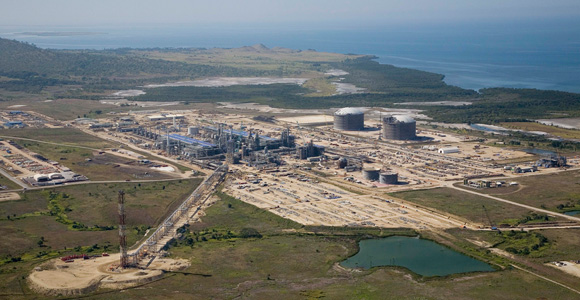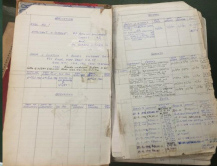Papua New Guinea has participated in its first report to the Extractive Industries Transparency Initiative (EITI), which is a global effort to improve transparency in resource rich countries.

The PNG LNG plant under construction. Credit: ExxonMobil
The aim of the initiative is to help countries avoid the so-called ‘resource curse’. This is the phenomenon whereby natural resource wealth makes other export sectors uncompetitive, leaving the economy vulnerable when prices fall.
The report, compiled by consultants EY, covers the calendar year of 2013 and examines the large scale mining and oil and gas industries.
It says the extractive sector plays a significant role in the country’s economy, dominating foreign investment and exports and providing downstream impacts on other industries, such as construction.
‘However, it has a more modest impact on government revenue, Gross Domestic Product (GDP) and employment,’ the report says.
The extractive industry accounted for 79.6 per cent of export revenues in 2013, the report says.
This included K3.3 billion in gold exports, K2.4 billion in oil and gas, K1.25 billion in copper and K286 million in mixed hydroxide precipitate.
Uneven reporting
Reporting from the sector was uneven, according to EY. They say Ok Tedi and Petromin provided ‘plentiful information online’, but note that the Independent Public Business Corporation of Papua New Guinea (IPBC) has been described as having ‘a consistent lack of transparency’.
EY point to an ‘urgent need’ to implement a ‘reliable, modern, registry system’ to supersede the current paper ledger system.
‘The Mineral Resources Development Company (MRDC) was not able to provide financial data more recent than 2009 despite having submitted its 2011 accounts to the Auditor General,’ the report says.
‘Given the significant public funds managed by MRDC, this is of particular concern. It denies the government and people of PNG adequate information about their interests, and leaves considerable scope for misappropriation.’
The report is critical of reporting standards to government.
It says corporate income tax and dividends are reported in the national budget as separate line items but other revenues are recorded in ‘various places’, most of which are considerably less transparent.
‘The category, number and balance of trust accounts in use could not be reliably identified, even by the Auditor General,’ the report says.
‘There is also no public information relating to the transfer of licences.’
The EITI study is ‘to be celebrated as a positive step forward’, the EY report says, because it ‘brings much information to light for the first time’.
EY points to an ‘urgent need’ to implement a ‘reliable, modern, registry system’ to supersede the current paper ledger system.
‘The register should be available to the public online.’
The consultancy is also critical of the payments system, which it says ‘leaves the system vulnerable to fraud, corruption and human error’.
A positive step
The EITI study is ‘to be celebrated as a positive step forward’, the EY report says, because it ‘brings much information to light for the first time and equips government, industry and civil society in PNG with a good baseline to improve transparency.’
Responses were mixed. ‘We found varied levels of willingness to engage in the reporting process,’ the report says. ‘While some entities were extremely helpful, many avoided contact—in one instance literally shutting the door on a representative of the independent administrator.’
The report notes that no State Owned Enterprise (SOE) was a member of the Multi-stakeholder Group (MSG). It recommends the Secretariat consider inviting them into the MSG.
The quality of government reporting can be improved, according to the report.

Oil and Gas Licences Source: EITI
‘Treasury should publish clear, accessible information on the Budget preparation process. Systems should be established to enable productive sharing of information between government agencies. The PNG government should develop and implement new legislation to enshrine EITI reporting requirements in law.’
The report says about 16 per cent of the value of mineral exports was captured by the government over the last decade.
It estimates the sector employs between 9000 and 30,000 people out of a population of 7.3 million.









Speak Your Mind